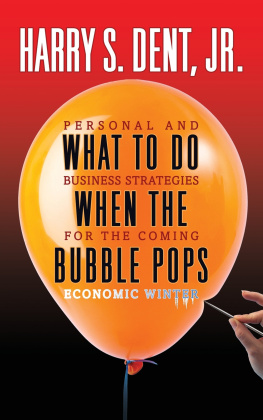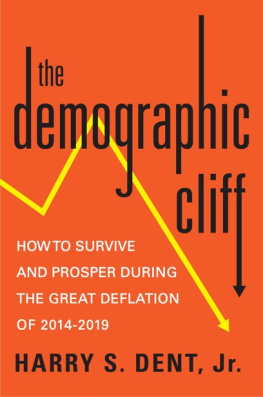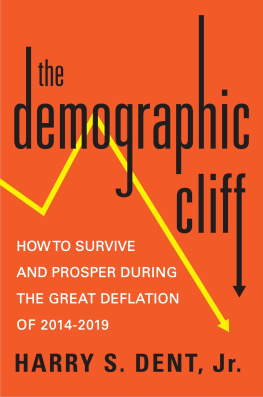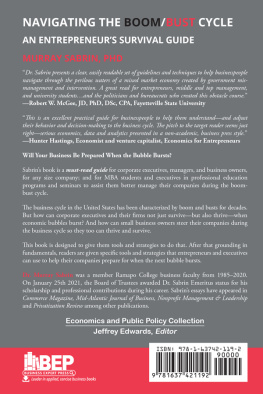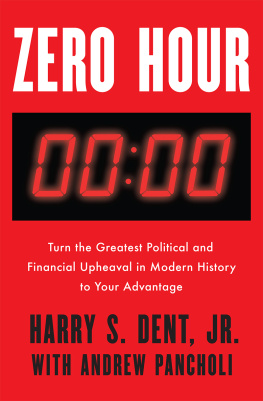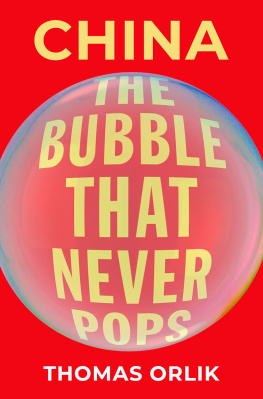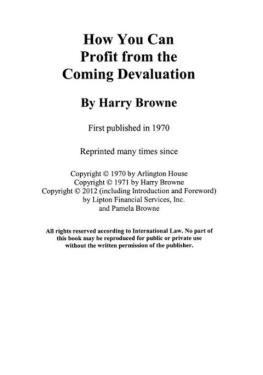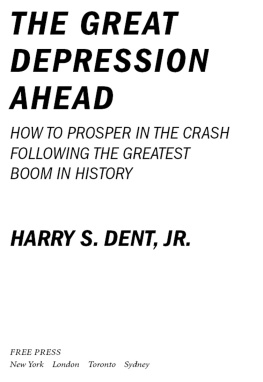
What to do When the Bubble Pops
ALSO BY HARRY S. DENT, JR.

Be Your Own Boss
What to do When the Bubble Pops
Personal and Business Strategies for the Coming Economic Winter
HARRY S. DENT, JR.


Published 2020 by Gildan Media LLC
aka G&D Media
www.GandDmedia.com
WHAT TO DO WHEN THE BUBBLE POPS. Copyright 2020 by Harry S. Dent, Jr. All rights reserved.
No part of this book may be reproduced or transmitted in any form, by any means, (electronic, photocopying, recording, or otherwise) without the prior written permission of the author. No liability is assumed with respect to the use of the information contained within. Although every precaution has been taken, the author and publisher assume no liability for errors or omissions. Neither is any liability assumed for damages resulting from the use of the information contained herein.
Front cover design by David Rheinhardt of Pyrographx
Interior design by Meghan Day Healey of Story Horse, LLC
Library of Congress Cataloging-in-Publication Data is available upon request
ISBN: 978-1-7225-0201-0
eISBN: 978-1-7225-2300-8
10 9 8 7 6 5 4 3 2 1
Contents
Introduction
I ve been forecasting trends in the economy since the late eighties. My forecasts are based not only on in-depth research into demo-graphics, economic cycles, and technologies, but also on practical business experience.
I have a different approach to the economy, and its something you can understand. Were not talking about complex, academic, economic principles. Were talking about the predictable things people, businesses, and technologies do as they move in the economy. I have predicted some major economic shifts that nobody else saw. In the late eighties, I foresaw the collapse of Japan and its real-estate and stock bubble. From the early nineties on, I foresaw the greatest boom in history for the rest of the world, especially Europe and the United States.
For decades now, weve been seeing a roller-coaster economy. This was not the way the economy looked after World War II, in the fifties and sixties. It started to change in the seventiesrecession after recession, along with the greatest inflation rates in history and the OPEC oil embargo. As Ill show later, the baby boom was the largest generation in history, both here in the United States and around the world, and in the seventies, it was just hitting the economy for the first time. Young people are expensive, and theyre the biggest cause of inflation. (Im going to explain a lot of things like this in common-sense terms.) Emerging countries are famous for having higher inflation rates. Thats because the populations are younger: they have much higher proportions of young people. So the seventies were the first time you could start to sense that something was different.
Now were in a whole new economy, with new technologies. The baby boomers created a great expense to be educated and then incorporated in the workforce, but they also brought in new technologiesthe information revolution. Those technologies further accelerated the globalization revolution. Thats what has caused such dramatic growth and volatility.
The next thing we saw were the recessions of 198082 and the highest unemployment since the Great Depression. Next thing you know, the stock markets booming. Next thing after that, in 1987, the stock market crashes 40 percent, for the most part in two weeks, 20 percent in one day. What caused that? That was the first sign of bubbling stock markets, the first since the Roaring Twenties. During the entire boom from 1942 to 1968, we had never seen a 40 percent correction in stocks. It was a much more moderate, predictable, and less volatile stock market. The largest corrections were more like 20 percent. So in the eighties, again, something was different, and it was the baby boomers.
Then in the early nineties, we saw the first savings and loan crisis. As Ive already pointed out, we saw the collapse of Japan. There was an absolute stock market rout and the biggest bursting of a real-estate bubble weve seen in modern times. That happened supposedly out of nowhere. People were calling it a black swan. This was not a black swan. Otherwise I couldnt have predicted it in 1988 and 89. What was causing this was the baby boom in Japan, which came and peaked much earlier than it did in the U.S.
In the nineties, we saw the great tech bubble and the great crash to follow. Everybody was flipping technology stocks from late 1994 into early 2000. It was the greatest stock run wed seen since 192529. What was causing this? Radical new technologies, the most powerful in history, but again, by this massive baby-boom generation. You get greater growth, greater bubbles, and greater crashes.
We finally recovered from the tech crash. We had another bubble, not as dramatic, from late 2002 to late 2007. It suddenly crashed in 2008 and early 2009, and we saw the deepest recession since the Great Depression. Its called the Great Financial Crisis or the Great Recession. Actually, it started to look like a depression, which I was predicting at the time.
Yet another time we saw a bubble burst, and central banks, beginning with the Federal Reserve, started to print money. They were throwing trillions of dollars into the economy to stop the entire banking system from failing, as it did in the early thirties. Governments always lower interest rates. They always start building dams and doing things to make business better, but this was something new. Theyd never before said, Were going to print a dollar for every dollar the economy or the stock market drops. Were just going to fill in the holes with dollars. Thats called quantitative easing, but its really printing money out of thin air. That ignited another bubble, and that bubble is peaking coming into 2020.
Ill show you why that the next crash is going to be worse than the last one. The next economic crisis is going to be more like the Great Depression. Ill show you why that happens. The Great Depression was not a black swan. Nor was the collapse of Japan in the early nineties. You can predict these are things if you understand what actually drives the economy.
To summarize, this whole boom, along with the inflation that preceded it, is more pervasive, more dynamic, and more global than weve ever seen. When we get a downturn, we dont just go down; everybody goes down. And this boom has been foolishly extended by central banks around the world, which propose to treat the greatest debt bubble in history with more debt. You dont treat a debt crisis with more debt any more than you deal with a drug habit with more heroin. A ten-year-old could figure this out.
In this book Im going to show you in simple and human terms why all of this is occurring, whats driving it, and where were going from here. First, you have to understand how we got here. My goal is to educate you enough so that you can take clear and decisive action to protect your assets and your family and will also see the dramatic opportunities ahead. Im going to show you that this will be a once-in-a-lifetime sale on financial and business assets.
Next page
